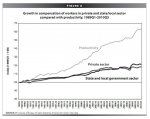- Joined
- May 29, 2009
- Messages
- 13,061
- Reaction score
- 5,128
- Location
- USA
- Gender
- Male
- Political Leaning
- Conservative
More evidence for those that don't believe basic econ applies to labor to ignore.
Minimum Wage Hikes Reduced Employment of Low-Skilled Workers | CNS News
Minimum Wage Hikes Reduced Employment of Low-Skilled Workers | CNS News
Two economists from the University of California at San Diego took advantage of this natural experiment and examined employment changes in states that were “bound” and “unbound” by the law.
“…we find that minimum wage increases significantly reduced the employment of low-skilled workers. By the second year following the $7.25 minimum’s implementation, we estimate that targeted workers’ employment rates had fallen by 6 percentage points (8%) more in ‘bound’ states than in ‘unbound’ states. Over the late 2000s the average effective minimum wage rate rose by nearly 30% across the United States. Our best estimate is that these minimum wage increases reduced the employment of working-age adults by 0.7 percentage points. This accounts for 14% of the employment rate’s total decline over this time period and amounts to 1.4 million workers. A disproportionate 45% of the affected workers were young adults (aged 15 to 24).”
“We find that binding minimum wage increases reduced low-skilled individuals’ average monthly incomes. Targeted workers’ average incomes fell by an average of $100 over the first year and by an additional $50 over the following two years. …We provide direct evidence that such losses translate into meaningful reductions in upward economic mobility. Two years following the minimum wage increases we study, low-skilled workers had become significantly less likely to transition into higher-wage employment in bound states than in unbound states.”

